No race left a more immediate mark in 2022 or altered the cycling landscape more dramatically than the Tour de France Femmes.
Whether it was the weight and prestige of the yellow jersey, or a decade’s worth of momentum in women’s cycling hitting a crest, the Tour de France Femmes marked a clear before and after in the sport.
Also read: Did ASO get it right with Tour de France Femmes course?
Women’s cycling was vaulted into the marquee lights, and the world responded with resounding applause.
Fans lined the road, media turned up en masse, and TV images broadcast a thrilling race to millions of viewers worldwide.
VeloNews awards 2022:
Kudos to ASO for pulling together a race that fit the times.
It’s just the start of something much bigger. With solid backers and clear momentum, the race will continue to grow and evolve into a season highlight on the calendar.
Best one-day men’s race: Strade Bianche
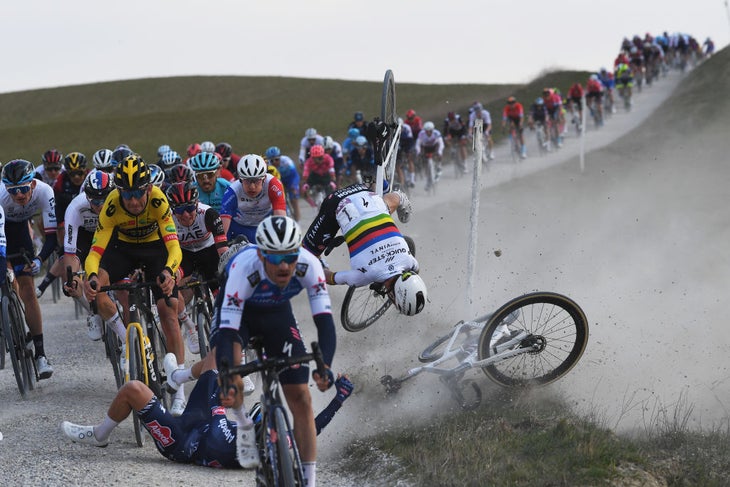
Tadej Pogačar took a page from Julius Caesar’s playbook: he came, he saw, he conquered. Pogačar was unstoppable with a long-distance attack that blew apart the race across the white roads of Tuscany.
High winds also provoked a high-speed crash involving world champion Julian Alaphilippe in a race day that delivered sparks start to finish at Strade Bianche. What a day, what a race.
Best one-day women’s race: Tour of Flanders
Lotte Kopecky was on a roll this spring, first by swarming to victory at Strade Bianche, before delivering a sublime victory at Tour of Flanders.
Van Vleuten was caught in an SD Worx trap late in the race, and Kopecky finished off the job with teammate Chantal van den Broek-Blaak in a winning sprint.
The trio had escaped on the descent of the Paterberg and opened up a one minute gap over the rest of the race. Much Belgian beer was spilt as Kopecky celebrated in the Belgian national jersey.
Best men’s stage race: Critérium du Dauphiné
One of France’s grand old dames enjoyed a renaissance in 2022, thanks in part to a clever course design that took the race deep into the hinterlands are rural France. With a leaner footprint than the gargantuan-sized Tour, organizers seem to revel in the chance to take the Dauphiné to places the Tour could never go.
The 2022 edition saw the first confirmation that Jonas Vingegaard was on track to win the yellow jersey. Though Primož Roglič won the overall, it was Vingegaard who shot the warning flares.
Best women’s stage race: Giro d’Italia Donne
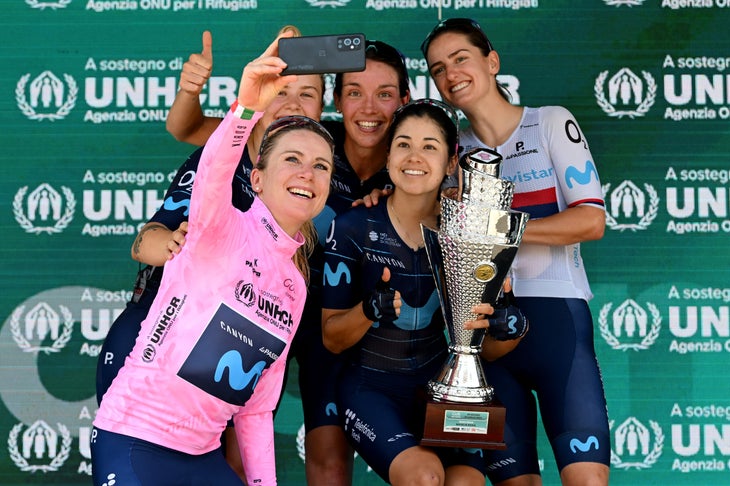
One almost has to feel bad for the Giro d’Italia Donne. Coming into 2022, the race successfully held its 33rd, going strong since the 1980s. Yet here comes ASO with the Tour de France Femmes to still its thunder.
The race hasn’t been without its problems, but organizers keep delivering arguably the hardest race on the calendar year in and year out. The climb-heavy parcours lately swings in favor of Van Vleuten, but it’s the rare place on the women’s calendar where the pure climbers can have their moment in the sun.
Best women’s team: SD Worx
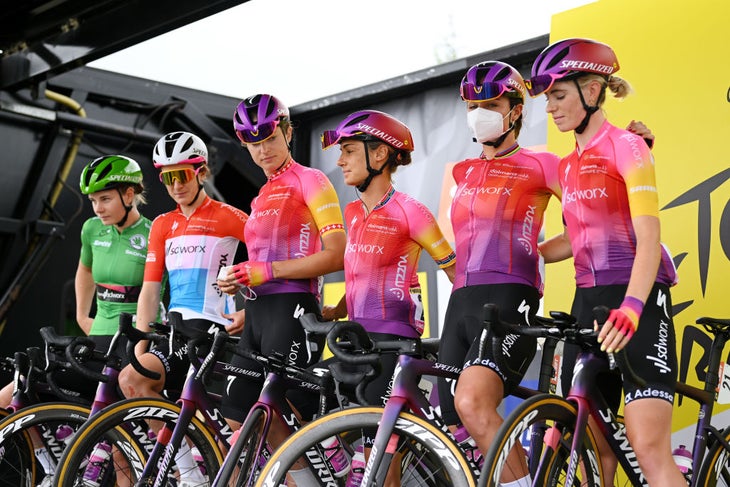
Facing more competition than ever before, yet SD Worx keeps on winning.
The retirement of Anna Van der Breggen at the end of 2021 didn’t slow down the team a bit. Arrivals of Lotte Kopecky and Marlen Reussen paid off in spades.
Also read: SD Worx is the top-ranked team again
With 19 victories, the team’s haul in 2022 included such prestige prizes as Strade Bianche, Tour of Flanders, Itzulia Women, Tour de Romandie Féminin, a stage win and second overall at Tour de France Femmes.
Annemiek van Vleuten is hard to beat when she’s at her best, but SX Worx proved all season that no team perform as consistently across its entire lineup.
The addition of Lorena Wiebes will only make the team even better in 2023.
Best men’s team: Jumbo-Visma
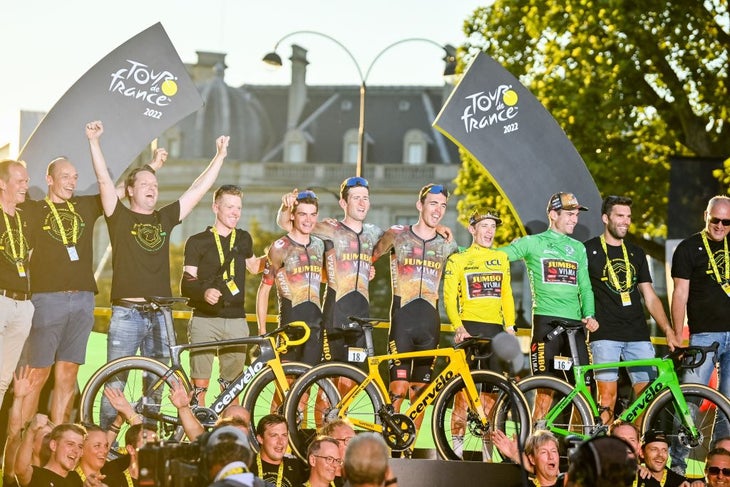
Barely 36 months ago, it seemed that Ineos Grenadiers was going to dominate the 2020’s the same way it did the 2010’s.
How quickly things can change. Flash-forward to 2022, and Ineos Grenadiers almost seemed to be playing catchup, despite one of its most successful seasons across the entire calendar in years.
Although cycling’s richest team won Paris-Roubaix, hit the podium at both the Giro d’Italia (second with Richard Carapaz) and the Tour de France (third with Geraint Thomas), and won 39 races, 2022 proved a watershed year at the top of the men’s peloton.
Also read: How Jumbo-Visma is raising its game to stay on top
Other teams — namely UAE Emirates and Jumbo-Visma — have caught up to Ineos Grenadiers, and in the case of the Dutch squad, surpassed it.
The ever-improving UAE still packs the one-man wrecking crew that is Tadej Pogačar, but it’s Jumbo-Visma that now brings the depth, budget, execution, and backroom planning and coaching to set the standard in the WorldTour.
It’s an astonishing accomplishment considering that the team was on the brink of closing barely a decade ago. Richard Plugge and his staff deserve kudos for how they’ve slowly built the decade’s new juggernaut from the ground up. They found Roglič in the aftermath of his ski jumping career and plucked Vingegaard from obscurity when he worked in a fish-packing plant to reach the heights of the peloton.
Best sport director women’s: Ina Yoko Teutenberg
The former German pro won more than 200 races during her career, but she’s stepped out to become one of the top directors in the peloton at Trek-Segafredo. The team claimed 34 victories in 2022, with wins from February all the way to October. Five new arrivals for 2023 will give her even more tools to deploy.
Best sport director men’s: Matt White
BikeExchange-Jayco (Jayco-AlUla in 2023) doesn’t pack the peloton’s biggest budget, but the team always swings above its weight. A big part of that reason is Matt White. The Aussie-backed team delivered its best Tour de France in years with two stage wins — one with Dylan Groenewegen and another with Michael Matthews. Plotting the tactics is White, who is popular within the team bus and helps squeeze the most out of his riders and team even when the chips are down.
Race botch of the year: Speed bump in final 700m at Vuelta a Burgos
Not everything was smooth sailing in 2022, and there were plenty of race-course miscues that continue to raise the hackles of the peloton.
The UCI and organizers promise they’re trying to do a better job at making race courses safer, more consistent, and better designed, yet things still happen.
Also read: Speed bump in closing straight triggers massive crash
One of the worst? The placement of the finishing straight that included an elevated, raised “zebra” pedestrian crossing within 700m of the finish line at the Vuelta a Burgos.
Dutch sprinter David Dekker crashed heavily when he struck the raised platform a few inches above the tarmac at near-full sprint speed.
Just when you thought it was over: COVID-19
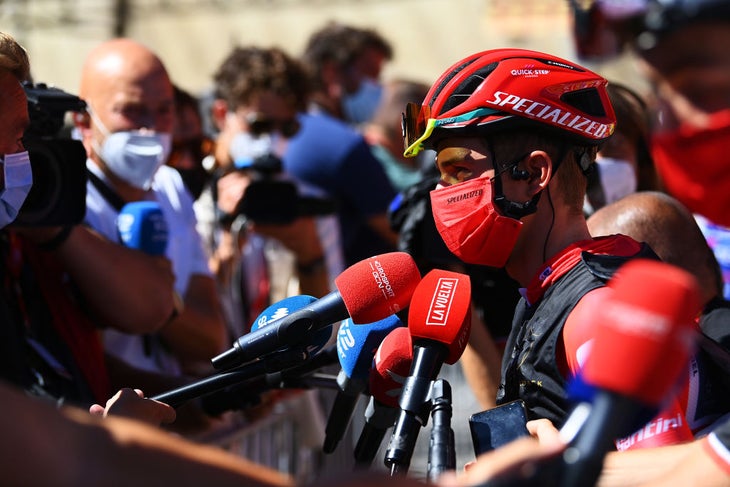
This “bicho” continued to sting across 2022. Races were still being canceled, and worse yet, riders will still getting sick.
Though the Tour de France and other races could unfold without the draconian rules or major disruptions that dominated in 2020 and to a lesser degree in 2021, the coronavirus almost had more impact on the racing this year than it did in the two previous seasons.
More riders left races due to illness and infection, especially the collective guard being lowered and the highly infectious yet less deadly omicron making the rounds.
Riders like Peter Sagan and Fernando Gaviria were infected up to three times across the past few years, but 2022 even saw more riders leave more races. Let’s hope the worse is finally behind the sport.
Driving a square peg into a round hole: Relegation-promotion
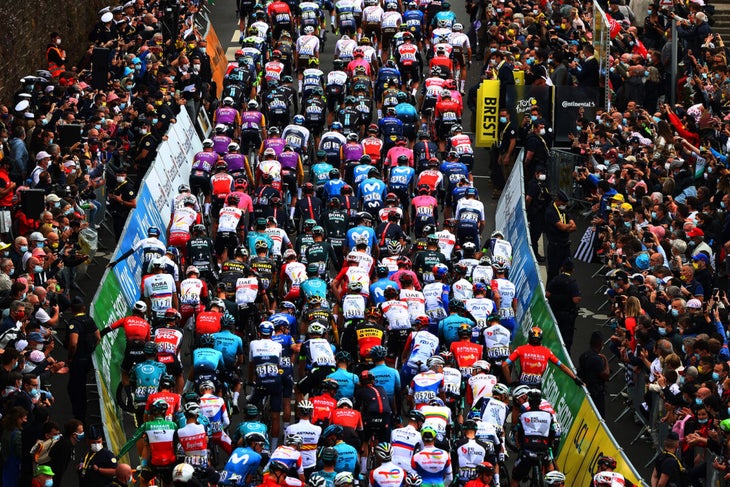
The 2022 season saw the rise of an idea who’s time has yet to come in the form of cycling’s relegation-promotion system.
In what was cycling’s old-guard snubbing its nose to the forces of change within the sport that want a more modern, Formula 1-style sport, with permanent franchises and streamlined ownership, the UCI unrolled its contrarian answer.
Arguing that cycling should follow a more “European” model, which, the argument goes, is more egalitarian, the UCI opted to impose a soccer/football-styled relegation-promotion system based on points.
Also read: UCI tweaks points system for 2023
Unlike Europe’s soccer leagues, which play matches against the same teams within the same leagues to battle for permanence, the UCI scheme reached across the entire globe.
A skewed points system that often awarded more points at smaller races than at major WorldTour events was a symptom of what many said was a solution looking for a problem that didn’t exist.
Though the rankings were contested across three seasons, it wasn’t until midway through the 2022 season that teams started to panic.
Injuries, illness, and the COVID-19 pandemic compounded losses for teams caught out on the wrong side of the points battle. It came down to the wire, and Lotto Soudal (now Lotto Dstny) and Israel Premier Tech were knocked out of the bigs.
The UCI introduced tweaks to the points system for 2023, and teams are already adjusting their racing calendar to chase points rather than victories.
Some were left asking: How does this help the sport?
Coolest race poster of the year: Tro-Bro Léon
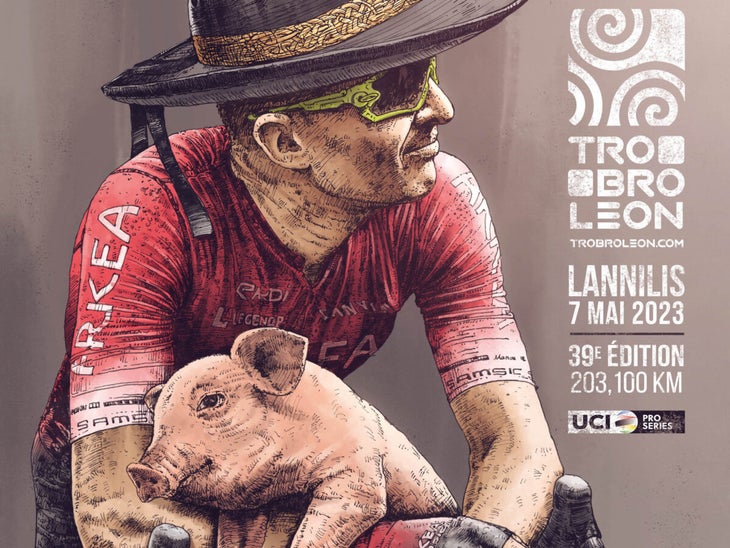
Race posters rarely hit the balance with design and look, but Tro-Bro Léon is making a tradition out of its distinctive annual race posters.
The small French one-day race has earned a spot in the hearts of cycling fans everywhere, especially with its mascot of a pig.
Race founder Jean-Paul Mellouët designs the annual poster, and this year’s edition features Breton rider Laurent Pichon from Arkéa-Samsic who’s raced the event 11 times.


